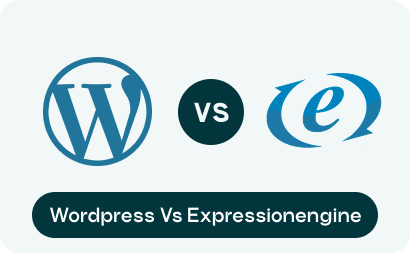Choosing the right content management system (CMS) is crucial for the success of your website. Two powerful CMS platforms—WordPress and ExpressionEngine—serve different audiences and use cases. While WordPress is the most widely used CMS globally, ExpressionEngine offers unique flexibility and control for custom projects.
This guide provides a detailed comparison of WordPress and ExpressionEngine based on usability, customization, performance, SEO, cost, and more.Overview of WordPress
WordPress is an open-source CMS known for its simplicity and massive ecosystem of themes and plugins. It powers over 43% of all websites globally and is suitable for blogs, business sites, eCommerce platforms, and more.Key Features
- Thousands of free and premium themes
- Extensive plugin library
- User-friendly interface
- Active developer and user community
- Custom post types and taxonomies
- SEO plugin support
Overview of ExpressionEngine
ExpressionEngine is a commercial CMS developed by Packet Tide. It is known for its flexibility and is widely used by developers to build custom websites with complex structures.Key Features
- Custom field types and content channels
- Powerful template engine
- Member management system
- Built-in caching and performance tools
- Focus on security and flexibility
- No rigid content structure
Feature Comparison Table
| Feature | WordPress | ExpressionEngine |
|---|---|---|
| Target Users | Bloggers, small to large businesses | Developers, agencies |
| Ease of Use | Beginner-friendly | Requires technical knowledge |
| Customization | Extensive with themes/plugins | Deep control via templates/code |
| SEO Tools | Excellent with plugins | Built-in SEO capabilities |
| eCommerce | WooCommerce and others | Requires third-party integration |
| Performance | Depends on plugins and hosting | Optimized for performance |
| Security | Needs plugins and updates | Built-in security-focused design |
| Community Support | Large global support | Smaller, developer-focused support |
| Licensing | Open-source, free core | Free and Pro versions available |
Ease of Use
WordPress
Offers a drag-and-drop experience with tools like Elementor, making it accessible to beginners and non-developers.ExpressionEngine
Best suited for developers who want precise control over site structure and output. The learning curve is steeper.Winner: WordPress
Performance
WordPress:
Can be fast, but performance depends heavily on the number and quality of installed plugins and the hosting environment.ExpressionEngine
Built with performance in mind, offering caching options and streamlined output, making it highly efficient for large or complex sites.Winner: ExpressionEngine
Customization and Flexibility
WordPress
Customization is easy with thousands of plugins and themes, but sometimes bloated.ExpressionEngine
Allows full control over data structures, templates, and design. Ideal for bespoke and scalable projects.Winner: ExpressionEngine (for developers)
SEO Capabilities
WordPress
Plugins like Yoast SEO and Rank Math offer in-depth SEO configuration and analysis.ExpressionEngine
Provides clean URLs, metadata fields, and SEO-friendly output. Requires manual configuration or extensions for advanced needs.Winner: WordPress (for ease), ExpressionEngine (for flexibility)
Security
WordPress
Regular updates and security plugins help, but being the most popular CMS also makes it a prime target for attacks.ExpressionEngine
Less targeted and more secure by design. Offers built-in security features like spam prevention, secure forms, and session management.Winner: ExpressionEngine
Cost and Licensing
WordPress
Free to use. Costs arise from premium themes, plugins, and hosting.ExpressionEngine
Offers a free core version. Pro version includes advanced features. Additional cost for premium support and some add-ons.Winner: Depends on project needs
Community and Support
WordPress
Large community, abundant tutorials, and forums. Support available from many third-party developers.ExpressionEngine
Smaller, but developer-focused community with detailed documentation. Direct support available with Pro plans.Winner: WordPress (for wider community), ExpressionEngine (for direct support)
Conclusion: Which CMS Should You Choose?
| Criteria | Best Choice |
| For Beginners | WordPress |
| For Custom Development | ExpressionEngine |
| For Blogging | WordPress |
| For High-Security Projects | ExpressionEngine |
| For Community Support | WordPress |
| For Performance | ExpressionEngine |
Final Verdict
If you're a non-developer or building a content-heavy site quickly, WordPress is the better option. For developers building complex, secure, and high-performance websites with complete control, ExpressionEngine shines.FAQs: WordPress vs ExpressionEngine
1. Is ExpressionEngine easier to use than WordPress?
No, ExpressionEngine is more suited for developers. WordPress is better for beginners and non-technical users.2. Can ExpressionEngine be used for blogging?
Yes, it can, but WordPress is more tailored for blogging with easier tools and plugins.3. Which CMS is better for SEO?
WordPress is easier for SEO with its plugin ecosystem. ExpressionEngine is also SEO-friendly but requires more manual setup.4. Is ExpressionEngine free?
Yes, a free core version is available. The Pro version offers additional features at a cost.5. Which is more secure: WordPress or ExpressionEngine?
ExpressionEngine offers more built-in security features and is less commonly targeted by hackers compared to WordPress.The world’s First zero commission platform
Hire tech partners effortlessly
 If you're a non-tech founder looking for an agency or a tech founder looking for engineers.
If you're a non-tech founder looking for an agency or a tech founder looking for engineers. You can get your 5 best matches from 2800 in 5 mins, with 1000 data points tracked.
You can get your 5 best matches from 2800 in 5 mins, with 1000 data points tracked. Connect directly with no credit card needed!
Connect directly with no credit card needed!
You’re just a click away from the best talent.


 Reading time: 4 minute(s)
Reading time: 4 minute(s) 

